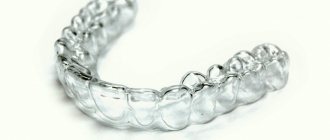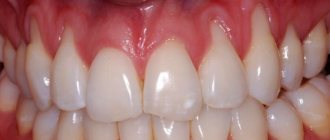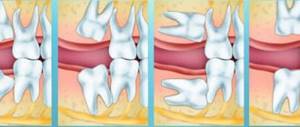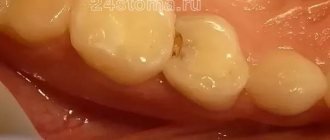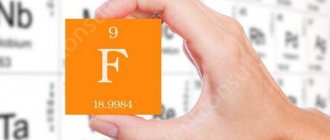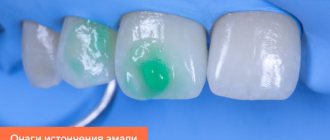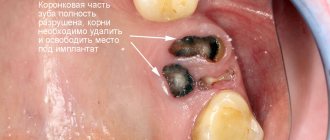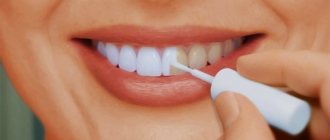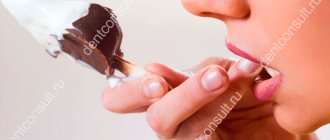Just a couple of centuries ago, dental problems were a relatively rare occurrence. The good ecology and natural nutrition of our recent ancestors contributed in the best possible way to the preservation of dentition, and only “bad” heredity or injuries forced us to seek medical help. Today, store shelves are literally bursting with oral care products. However, the queue to see the dentist is not decreasing, and his patients are becoming younger. What is the reason for such an unpleasant phenomenon?
Our contemporaries must be given their due - with all the variety of ways to maintain healthy teeth, we rarely use professional recommendations, leaving this issue to chance. The food we eat can be called healthy by a huge stretch, but its careful grinding and lengthy cooking make the food too soft. Even a salad of fresh vegetables in the hands of professional chefs turns into something light and airy, which does not require additional “teeth effort”. And, of course, a love for sweets that literally destroy tooth enamel and dental tissue.
All of the above has the most negative impact on the condition of the teeth. Rapid destruction, frequent loss, numerous diseases, pain and discomfort - almost every person is familiar with these unpleasant phenomena. But it's never too late to change your lifestyle and attitude towards your teeth! Pay attention to your diet, follow the recommendations of specialists and give up everything that poses a danger to your teeth - and you will be able to smile at your grandchildren with a Hollywood smile, and not show off the best examples of implants or denture designs.
How to floss
Dental floss is also called floss. The purpose of floss is to clean the spaces between the teeth and those hard-to-reach places that a regular toothbrush cannot clean. Our patients often ask how to floss. Correctly brushing the surface of the teeth with dental floss is necessary with vertical movements, without touching the gums. Regular flossing after meals will help keep your teeth healthy and prevent tooth decay and plaque buildup.
For people who have a dental crown, inlay or even braces, there are super-flosses. They are thicker than regular dental floss and are therefore suitable for safely cleaning teeth. If you have the opportunity, lubricate it with a small amount of toothpaste before flossing. This is an additional prevention of dental diseases. After using dental floss, be sure to rinse your mouth.
Use an electric toothbrush
The electric toothbrush has become one of the biggest advancements in home dentistry. Electric toothbrushes come with a timer to help you control your brushing time. If you brush your teeth long enough, the plaque will not be completely removed. Electric brushes easily remove plaque from the cavities between the teeth and gums.
If you clench or grind your teeth while you sleep, you should use a night protector.
Grinding wears down up to a millimeter of tooth enamel per year. Constant clenching of the jaws seems harmless, but at the same time the teeth are constantly under stress, which will gradually destroy them. This leads to weakening gums, bone loss and inevitable tooth loss. The night protector will protect the teeth from gradual destruction.
Mouthwash
Mouth rinse removes accumulated food deposits. It is recommended to use it after every meal. The composition of the mouthwash is very soft, it does not injure the teeth and gums at all and serves as an excellent prevention of dental diseases. Mouthwash should be used with caution after tooth extraction, or it is better to avoid it altogether for several days.
An additional advantage of mouthwash is its ability to give fresh breath thanks to the components it contains. After using the rinse, refrain from eating and various drinks for a short time so as not to “interrupt” the therapeutic effect.
Dental diseases: types and treatment
Toothache can be caused by various reasons. Depending on the degree of damage to tooth tissue, different diagnoses are made. Dentistry has learned to deal with almost all pathologies while preserving the patient’s teeth.
Caries
The most common dental disease. This is the initial stage of tooth destruction, when its mineral shell, the enamel, is damaged. This happens due to the development of pathogenic microflora, which is associated with insufficient oral hygiene and abuse of sweets.
In the early stages, caries can be successfully treated even without drilling. Damaged areas of enamel are treated with a special chemical composition or “cauterized” with a laser.
In case of deep caries, the damaged tissue is removed, the cavity is treated and a filling is placed. Modern light-curing filling materials are durable and have a wide range of colors. The doctor will select a filling so that it will be visually invisible on the surface of the tooth.
Many more serious dental diseases develop from advanced caries.
Pulpitis
This is the first of the complications of caries. Pulpitis is inflammation of the pulp (neurovascular bundle inside the tooth). This dental disease is characterized by acute, unbearable pain, which is not always relieved with pills. At night, unpleasant symptoms intensify, the pain becomes aching.
With initial pulpitis, there is a chance to preserve the integrity of the tooth. The damaged tissue is removed and medication is applied to the diseased area, covering the tooth with a temporary filling. If such methods do not help and the inflammation has spread far, the doctor, under anesthesia, depulps the tooth - removes the pulp and cleans the canals. After this, they are filled, and the tooth that is dead inside looks natural in appearance and performs its chewing function.
Periodontitis
Another inflammatory process that develops with advanced caries. With periodontitis, the root membrane of the teeth and adjacent tissues are affected. Symptoms are acute pain that worsens when biting. Treatment is similar to the treatment of pulpitis.
Odontogenic periostitis (flux)
Periostitis refers to inflammation of the periosteum. This disease is better known as flux. Most often, periostitis is odontogenic, that is, it is caused by advanced dental disease. The symptoms of flux are known to many - acute pain, severe swelling. Such manifestations require immediate consultation with a doctor, otherwise inflammation from the periosteum will spread into the jaw bone tissue.
Treatment of odontogenic periostitis begins with eliminating the cause - the diseased tooth is either treated or removed if nothing can be done. The purulent cavity is opened, washed, and if necessary, drainage is installed to drain the pus. At the same time, painkillers and anti-inflammatory drugs are prescribed. Physiotherapy is also effective.
Sensitivity of tooth enamel
If a tooth begins to react sharply to cold or hot food, this is a sign that the enamel is damaged or thinned. Causes: mechanical damage, bruxism (involuntary grinding of teeth), smoking, eating foods rich in acids (sour fruits), unprofessional or too frequent teeth whitening and some dental diseases.
Teeth hypersensitivity is treated by treating them with special gels that normalize the mineral composition of the enamel. Typically, such products are rich in fluoride. This procedure can only be carried out in a clinic.
There are other dental diseases. To avoid problems, undergo preventive examinations in the clinic and contact your dentists at the first unpleasant symptoms.
Regular visits to the dentist
Comprehensive oral care cannot be achieved without regular visits to the dentist. It is common knowledge that a dental consultation is required twice a year. If you suffer from any diseases of the oral cavity, then you need to visit the doctor more often - in this case, the dentist himself will set the time for your next visit.
Regular visits to the dentist are an excellent prevention of dental diseases, because prevention is always better than cure. The doctor can notice some complications in time, prescribe preventive measures and thereby keep the teeth healthy and prevent their destruction.
It is also advisable to carry out hygienic teeth cleaning twice a year. It differs from “home” in the use of modern devices and technologies that clean teeth in very hard-to-reach places. Professional cleaning also cleans teeth of plaque and even tartar (it is impossible to get rid of tartar at home), and slightly whitens the surface of the teeth.
Clinical researches
ASEPTA toothpastes are clinically proven effective. For example, it was confirmed that regular use of professional toothpaste ASEPTA COFFEE AND TOBACCO for a month improved the hydration of the mucous membrane by 3.3 times, the remineralizing efficiency increased by 3.9 times, at the same time, the cleansing effect had increasing dynamics and reached 60 .5% at 4 weeks of use.
Sources:
- Clinical and laboratory assessment of the influence of domestic therapeutic and prophylactic toothpaste based on plant extracts on the condition of the oral cavity in patients with simple marginal gingivitis. Doctor of Medical Sciences, Professor Elovikova T.M.1, Candidate of Chemical Sciences, Associate Professor Ermishina E.Yu. 2, Doctor of Technical Sciences Associate Professor Belokonova N.A. 2 Department of Therapeutic Dentistry USMU1, Department of General Chemistry USMU2
- Report on determining/confirming the preventive properties of toothpaste “ASEPTA PLUS” COFFEE and TOBACCO Author: doctor-researcher A.A. Leontyev, head Department of Preventive Dentistry, Doctor of Medical Sciences, Professor S.B. Ulitovsky. First St. Petersburg State Medical University named after. acad. I.P. Pavlova, Department of Preventive Dentistry
- Report on determining/confirming the preventive properties of toothpaste “ASEPTA PLUS” GENTLE WHITENING” Author: doctor-researcher A.A. Leontyev, head Department of Preventive Dentistry, Doctor of Medical Sciences, Professor S.B. Ulitovsky First St. Petersburg State Medical University named after. acad. I.P. Pavlova, Department of Preventive Dentistry
Dentist tips and tricks
In addition to daily cleaning of enamel , it is worth paying attention to specific cases of oral care.
For example, the teeth of a one-year-old child require special care: the mother needs to soak cotton wool in boiling water twice a day after feeding and wipe the erupted teeth.
Note ! During pregnancy, it is especially important to maintain dental health. At the first suspicion of caries, be sure to visit a dental clinic.
Dentists recommend following these tips when caring for your teeth in different situations.:
| Caring for metal-ceramic crowns | Particular attention is paid to the junction of the prosthesis and the gums. This is where food accumulates. To do this, use a high-quality toothbrush to remove any leftover food. |
| Implant care | To brush your teeth, use a soft brush and dental floss. After installation, you need to visit a specialist once every six months. |
| Availability of bracket system | Braces are cleaned with a special brush and dental floss after each meal. Particular attention is paid to locks and arches |
| Caring for dentures | Dentures are cleaned daily with a soft brush; it is recommended to place them in a disinfectant solution at night. |
By following simple rules for caring for your teeth and oral cavity, you can not only maintain your health, but also increase your attractiveness. A snow-white smile is the key to successful people.
Eat right
There will be no strong teeth if the body lacks fluoride and calcium. Calcium is absorbed with the help of vitamin D, which comes from food or is synthesized by the body independently under the influence of ultraviolet radiation. Therefore, we take a pen and write down: veal, poultry, eggs, butter and sea fish are a source of vitamin D; yoghurts, cheeses, spinach and broccoli are a source of calcium; Black tea, wholemeal bread and fish contain fluoride. We include these products in our regular diet - and we can handle everything.
If there is still not enough calcium or fluoride in the body, we use dietary supplements and vitamin-mineral complexes. Fortunately, now their choice is especially rich.
Pregnancy
During pregnancy, dental health can deteriorate significantly. There are fewer reserves of vitamins and minerals, the body’s defenses are reduced, and the likelihood of pathogenic microbes penetrating into the tissues of the gums and teeth increases.
And if a woman did not take care of her oral health before bearing a child, then the pathological process will only worsen until the complete loss of teeth.
The source of chronic infection is very dangerous for the unborn baby. It can lead to sepsis, which will certainly affect the development and growth of the fetus and the course of pregnancy. Therefore, during this period there is no need to postpone a visit to the dentist, but on the contrary, you should rush to see a doctor.
On house
The regional dental clinic will launch health trains.
Over the past year, the Ministry of Health purchased about 40 dental units for healthcare institutions in the region. A dental tomograph was purchased directly for the regional clinic.
“However, today, judging by the analysis of the staffing supply, dentists and dentists in the region are about 70 percent of what is needed. Based on these conditions, the acquisition of several mobile systems is planned for 2021. They will be equipped with at least two dental units and diagnostic x-ray equipment,” says Oleg Kovalev, head physician of the Regional Dental Clinic.
The regional institution intends to create an organizational and methodological center, the task of which will be to moderate the provision of dental care to the entire population of the region. Mobile teams will identify specialized diseases. They will be able to provide some assistance to patients locally. For treatment of more serious pathologies, patients will be invited to Barnaul, immediately assigning them a convenient time to visit the doctor.
Diabetes
The presence of microbes in circulating blood causes a change in its rheological properties. An increase in viscosity leads to disruption of transport function, a decrease in blood flow speed, and inhibition of metabolism. In turn, metabolic disorders reduce the ability of insulin to regulate blood sugar levels. Glucose concentration increases.
As a result, most people gain weight and develop diabetes. Under conditions of high sugar levels, irreversible changes occur:
- tissue nutrition is disrupted;
- the walls of blood vessels are damaged;
- stagnation develops;
- the quality and life expectancy decreases.
Cardiovascular diseases
Pathogenic microorganisms that cause inflammation in the oral cavity can negatively affect the functioning of the heart and blood vessels. If you ignore the problem and do not carry out timely treatment, then the infection may soon migrate from the source of inflammation through the bloodstream to the heart.
Infection provokes a number of progressive pathological processes in this organ. Metabolism is disrupted, toxic waste products of microbes are formed. As a result, infectious agents infect organ tissues and create foci of secondary infection in them. As a result, the likelihood of pericarditis, endocarditis and other diseases increases.
The vessels through which the pathogen moves to the heart also become the target of damage. Their walls become inflamed, increasing the likelihood of hemorrhages, blood clots, blood pressure surges, etc.
